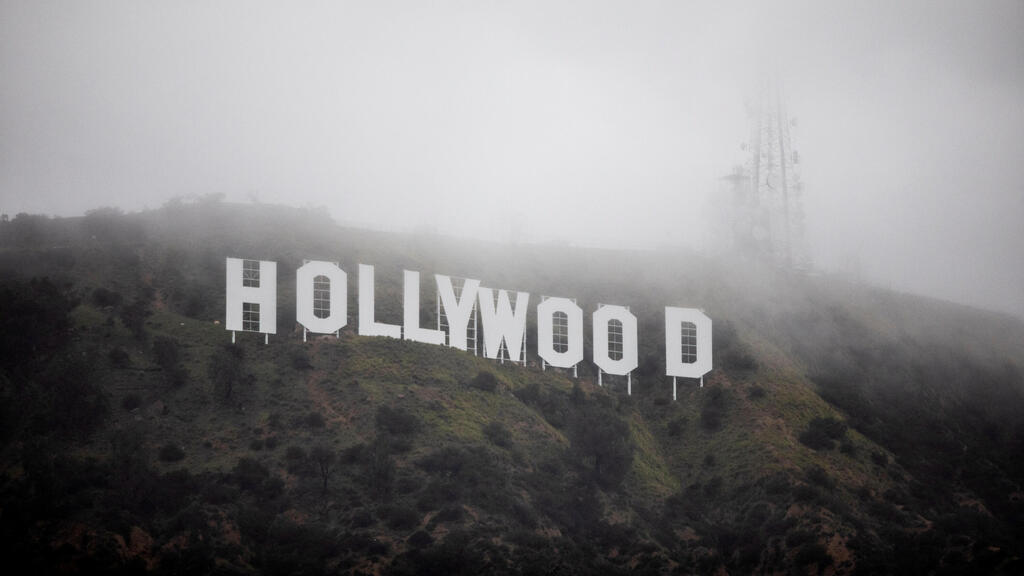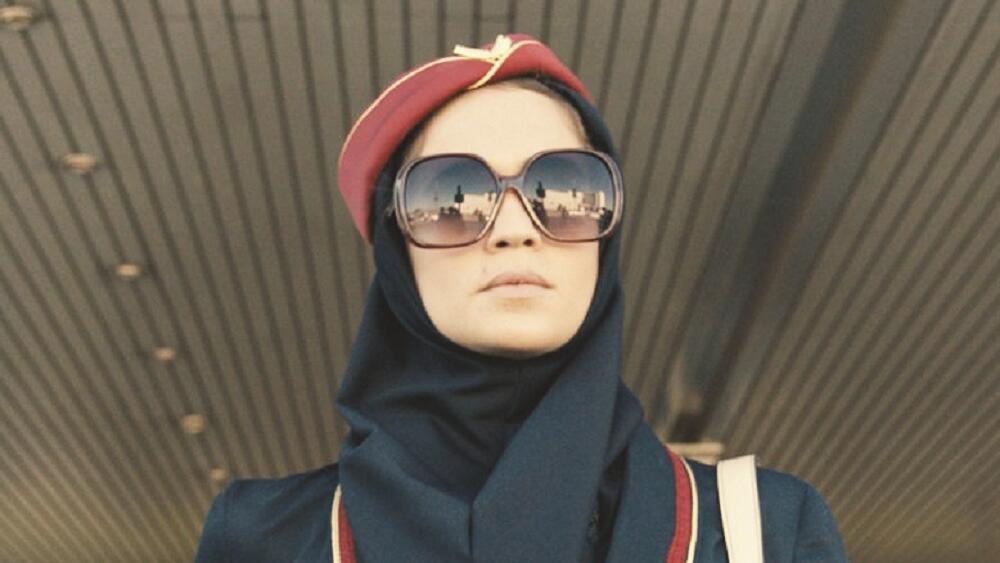Getting your Trinity Audio player ready...
Meir Fenigstein, founder and director of the Israel Film Festival in Los Angeles for more than 30 years, was hoping to fill the cinema halls again after the COVID pandemic and its consequences. But then October 7 happened, and it was clear that the festival had to be postponed.
"I thought the war would last two months, tops", said Fenigstein shortly before the opening. "I postponed it to December, then to March, and when I realized that the war was not going to be over soon, I postponed it to November."
After quite a bit of work, and under a lot of pressure, the Israeli Film Festival in Los Angeles opened with a special screening of Israel's official submission for the Best International Feature Film at the 97th Academy Awards, "Come Closer" by Tom Nesher. But despite a smooth opening ceremony, the theaters were less keen to cooperate with Israeli work.
"A certain theatre agreed to screen the films, as long as there was no advertisement for the festival outside the hall. Not even one. I could advertise a specific film, but people wouldn't know that it was part of the Israel Film Festival. Even in the lobby of the theater, it was impossible to place anything to suggest that a festival took place inside.
"The owner of the venue told me, 'I want to have the least attention. Inside the theater, you can do whatever you want, but outside - nothing.' They're afraid that frequent visitors to this theater will say, 'Since you're having an Israel film festival, we won't come here anymore. You are traitors."
More difficult and unpleasant
Like any other part of our lives, Israeli culture was treated in different ways since October 7. At first, it was surrounded by a sense of mourning and shock. A few months later, when it began to recover a little and tried to break out, it encountered a cultural world that was in part devoid of empathy, partly hostile, and in part refrained from any involvement in what was happening in the Middle East.
As a result, it was one of the most difficult years ever for Israeli culture abroad. This holds true for Israeli art and literature, as well as for Israel's most popular cultural export industry – cinema and television, in Hollywood.
Hollywood does not boycott Israeli cultural creation, nor has it become antisemitic all of a sudden, as it has a problematic history of antisemitism long before October 7. It can't be claimed that Israeli actors will no longer work in Hollywood. But this year everything has been more difficult, unpleasant, and sometimes heartbreaking.
In the first days that followed October 7, the American show-business, Jews and non-Jews alike, stood 100% with Israel. Bono's documentary, dedicating a song in his Las Vegas concert for Israel's "beautiful kids" massacred at the Nova music festival, was perhaps the best cultural "Hasbara" moment for Israel in recent years. Later, the support trend shifted.
But there is a difference between the attitude prevalent in the world toward Israeli arts and that of the U.S. in general, and certainly Hollywood in particular. Pro-Palestinians will assert that the U.S. film industry still takes Israel's side, and by and large, they are not wrong.
The fierce reactions to the Oscar acceptance speech that director Jonathan Glazer made, where he attacked Israel, claiming that "the Holocaust being hijacked by an occupation," clearly showed that anti-Israel sentiment is rejected by most in Hollywood.
"What happened this year is that the boundaries between Jews and Israelis were blurred after October 7," says an Israeli actor who works in Hollywood. "It affected the entire Jewish community in the U.S., which realized that this massacre was against Jews, not just against Israelis, and many Jews in Hollywood were appalled by it. That's why I think that our situation in the industry is safer than what people might think.
On the other hand, a younger generation is growing up here, which is much more diverse, racially and ethnically, and the images that have been coming in from Gaza all year were very difficult. They are soon to be the decision-makers here, and I think that when that time comes, it will be more challenging for us here."
The signs of this hardship could be noticed already in the reactions made by certain Hollywood creators not long after October 7. The Writers Guild of America (WGA), for example, maintained complete silence after the horrific October 7 massacre occurred in Gaza border communities; it was a deafening silence, especially in light of the fact that many of its members are Jewish.
Dozens of them, however, published a very sharp letter of protest against the union, signed by Jerry Seinfeld, Sacha Baron Cohen, Eric Roth, Matthew Weiner and James Patterson, among others.
In terms of the top decision-makers, from studio owners to producers and super-agents, Hollywood is still full of Jews who support Israel. "I have not faced any problems this year," says a Jewish executive in the industry. "On the contrary, I have only received messages of support."
Those who experienced hardship were Israeli creators and actors, because they were judged by their country of origin – and sometimes just by their Jewishness – and paid a price for the pride they took in their origin.
Gal Gadot illustrated a fairly accurate picture of the situation in an online conversation with Israel's President Isaac Herzog held at an event to officially launch the "Kol Ha’am" - Voice of the People - initiative, aiming to promote global Jewish unity.
"15 years ago, when I started off, being an Israeli here was something that people were impressed and excited about,” Gadot said. “I’m not saying that this is not the case today, but now it’s charged, things have changed. I often find myself in awkward situations, having to maintain complex and unpleasant conversations."
Gadot has been experiencing it personally on social media since her breakout role as “Wonder Woman”, but she’s already a big enough star to survive this period without much damage. It’s been much harder for other Israeli actors, though.
“I was at an audition where one of the examiners said straight to my face, ‘The images of what Hamas did on October 7 are haunting me, but I can’t justify anything you do to the Palestinians under the leadership of this prime minister,’” says an Israeli actor. “I didn’t answer him. It’s better not to say anything now, and rather keep your head down, hoping this wave passes."
The one who’s receiving substantial backlash these days is Israeli actress Noa Cohen, who plays the titular character in Netflix’s film “Mary”. Pro-Palestinian activists are sharply criticizing director DJ Caruso for choosing a Jewish Israeli actress to play the role of the mother of Jesus, who was herself a Jewish woman living in Israel.
“Not only did the cast lack Arab or a Palestinian representation, but the one playing the role of Mary is Israeli,” protested an X user. Another user wrote: “The fact that they are casting an Israeli as Mary is profoundly offensive. They are erasing the Palestinian history.”
Also, the casting of Israeli actress Shira Haas as the new Marvel superhero "Sabra" in the Captain America film sparked outrage among pro-Palestinian organizations, prompting Marvel studios to announce it would "take a new approach with the character Sabra."
There were also reports online claiming that anti-Israel sentiment, induced by the Gaza war, impacted the design of the new character. Some were concerned about the developments, but the new trailer that was recently released included hefty screentime for the character of Haas, and provided some relief in the industry.
Get the Ynetnews app on your smartphone: Google Play: https://bit.ly/4eJ37pE | Apple App Store: https://bit.ly/3ZL7iNv
Rays of hope
The Toronto International Film Festival is the largest film festival in North America, which also kicks off the Hollywood awards season. It’s not easy to get accepted to the festival, and when it happens, it provides networking opportunities.
For some films, it opens the door to widespread distribution and a chance to win the awards granted in Hollywood, for others it opens the door to more modest venues, and sometimes acceptance into such festival brings mainly a sense of relief.
That’s what director Shemi Zarhin felt when he heard that his beautiful and human film "Bliss" was accepted into the festival held in September.
This is the second time that a film by Zarhin has participated in Toronto, the previous time being in 2015 with the film "The Kind Words"; this time he was a bit surprised, given the harsh year for Israeli works worldwide.
"We are known in Toronto," says Zarhin. "In a normal situation, I might have expected to be accepted, but this time we were preparing ourselves for a rejection. Even the announcement of the film's acceptance into the festival was postponed until the very last minute, probably to avoid protests as much as possible."
6 View gallery


Noa Cohen in 'Mary' “The fact that they are casting an Israeli as Mary is profoundly offensive"
(Photo: Christopher Raphael/Netflix)
What was the experience like there?
"There were demonstrations during the screenings, both inside and outside the hall. People shouted that 'the film was funded by a state committing genocide'. This was also happening when three or four Palestinian films were being screened at the festival. There was a lot of security. The atmosphere was different than in our previous visit, but the film was screened calmly and beautifully, and the reactions were good, and we left feeling more relaxed."
"It's true that it's been difficult to be an Israeli filmmaker this year, and usually the representation of Israeli films at festivals is greater, but there is still some hope", added Zarhin. After the screening of "Bliss" in Toronto we were invited to festivals around the world; I hope this will break the curse,” Zarhin said, anticipating that "next year will be better for all of us."
The Scripted Israel Conference, which aims to forge connections between Israeli creators and Hollywood TV industry figures, also provided some hope. This year, the closing event, like the previous time, was held at the at the Academy Museum of Motion Pictures, and it centered around a special screening of the first episode of “One Day in October”, which deals with October 7 massacre. Like the old festival, the relatively new conference also went through a difficult path, certainly more complex than the first year.
"The first conference, held two years ago, celebrated an Israeli television industry that is considered one of the best in the world, certainly in terms of market size and language. We felt like we were the most popular there," say Tchelet Semel and Daniel Susz, co-founders of the conference.
"The truth is, even back then the attitude toward Israel of more elite circles, like the art world and film festivals, was very different compared to the television industry – where money talks, and where Israel produced 'hits'. The timing also played in our favor, the streamers flourished and the most watched series were international. And now, two years later, we are in a completely different world – both in terms of the industry, and of course, in terms of the situation in Israel."
What does this mean?
"Two years ago we could approach people asking them to invite their colleagues to the conference, and they would be happy to come. Now we turned to specific people, we didn't even try to approach those we knew would refuse, and we used the connections that Israel already had in Hollywood. It's sad, because we want to bring people from the outside, that's actually our goal, to connect the Israeli industry to the U.S. industry here.
Last time the conference took place in a shared workspace, and part of the fun was that people could mingle and get to know each other. This year we had to create sterile spaces and make sure that nothing would make the attendees feel uncomfortable."
Despite the difficulties, the conference hosted 56 companies, but Semel and Susz cannot disclose who showed up. "Unlike last time, now we can't disclose details about the companies and agencies we met. There is a very big difference between people and brands. People are with us, but brands have a hard time connecting with Israel right now - so things had to be done privately. There were also cancellations, people turned pale and apologized, but they had no other choice, the brand wanted nothing to do with us.
"The industry these days is depressed, fearing to take risks. In such a climate, one can do almost nothing. We held our event feeling panic at first, but later we were encouraged to see that things were moving forward, and deals were made. The big question is whether what happened this year was a coincidence induced by the Gaza war or whether there is really a trend of change in Hollywood, along with the generation change, taking into account that those who will run the industry in the future are less fond of Israel."
Shula Spiegel, who co-produced with Dana Eden the successful TV series "Tehran" attended the conference and left it optimistic. "I wouldn't say that Israeli content is popular right now, but it's an industry that works for the long run.
"We're getting offers from Netflix until 2026, so there's no need to be worried. I didn't feel like we were being rejected, but many of the participants were Jewish, so maybe that had a bit of an impact on the atmosphere, which was much better than I anticipated. We received only compliments on what we were doing, and the offers I brought started rolling."
Delay after delay
The ones who took a serious blow were the Israeli TV series. The Hebrew-language TV series “Bros,” created by Israelis Hanan Savyon and Guy Amir was acquired by Netflix, scheduled to launch in October 2023. The release was inevitably postponed, and finally went on the air quietly and without a marketing campaign.
More than a year ago Netflix also acquired the rights to Israeli TV series "Border Police", created by Meni Yaish, starring comedian Shalom Michaelshvili and singer Shlomi Shabbat, but it has not yet been distributed for broadcast worldwide as previously planned.
Another series that has been significantly delayed was "Tehran", by Apple TV+ and Israel’s Kan public broadcaster. The third season of the award-winning espionage thriller was supposed to air in March, but Apple vetoed it due to the ongoing war, until it was finally aired in early December.
Even before they announced that there would be no more delays, Spiegel was not much bothered: "We can understand that. I didn't feel like they were turning their backs on us, the fact is that we are already writing the fourth season. The appreciation and respect for the Israeli industry has not changed. Our successes are being acknowledged, and we know that we are professionals, but it has been a difficult year for everyone, including us."
Figures in the industry explain that it is difficult to market Israeli works today. “It’s very, very challenging, certainly a series like ‘Tehran,’” says a senior executive at a major streamer. “It’s hard to promote it right now. I know that there's a new season of ‘Fauda' in progress, and I hope that by the time it’s ready for international broadcast, all of this will be behind us."
But if you ask Adam Berkowitz who was co-head of the television department at leading entertainment and sports agency Creative Artists Agency (CAA), and later founder of Lenore Entertainment Group, thinks that Israel has no particular problem in Hollywood. Berkowitz works with many of the world’s leading television producers, writers, and directors. He has been instrumental in packaging and selling critically acclaimed Israeli series including "Losing Alice" to Apple TV+, "Fauda" to Netflix and "Rehearsals" to Hulu.
When asked if there is an increase in pro-Palestinian impact on Hollywood, he laughs. “There’s nothing like that. There’s a problem with foreign content in general now, it’s not related to Israeli content. Everyone is looking for material in English."
So, is this just Israeli paranoia?
“It's true that there is a problem with film festivals, and it’s more challenging to sell shows that feel political, but it’s not something that can’t be overcome. It’s an industry that has its ups and downs, but I’ve sold many Israeli series, I’m about to sell more, and I don’t think there’s any reason to worry."
Separation between Judaism and Israel
If there’s one thing Hollywood has been careful to do this year, even more so than before, is to separate Judaism from Israel, even artificially if necessary. This is particularly evident in the Netflix hit “Nobody Wants This.” The comedic drama about the romantic journey of a young rabbi and a beautiful, non-Jewish woman, “Nobody Wants This" perpetuates Jewish stereotypes in a way that somehow can be acceptable, but it is very careful not to mention Israel in any family or ceremonial scenes.
It’s a complete misrepresentation of Jewish life in America, especially in the last year, but Hollywood has always had a hard time dealing with Jewish representation, even regardless of Israel, and this year has only aggravated the problem.
The difficulty was particularly apparent when The Academy of Motion Picture Arts and Sciences opened last fall. The acknowledgement of the contribution of the Jewish immigrants who founded Hollywood was conspicuously absent. It would have looked very bad any year, but this year in particular. After extensive criticism, the Museum opened a new permanent exhibit titled “Hollywoodland: Jewish Founders and the Making of a Movie Capital”.
It took less than two weeks until it was met with blowback, stating that the content of the exhibition was antisemitic, and the museum was forced to make exhibit changes, eliminating the "phrasing that may unintentionally reinforce stereotypes."
6 View gallery


'Nobody Wants This'. Perpetuates Jewish stereotypes without mentioning Israel
(Photo: Netflix)
But perhaps the most notable case in which Judaism, antisemitism, and support for Israel have mingled was that of actress Julianna Margulies, star of “The Good Wife.” Margulies has become one of the most outspoken activists in the fight against antisemitism in Hollywood this year, and she had great influence because of her affiliation to the liberal side of political spectrum.
She attacked, among others, the pro-Palestinian protesters, saying that a large portion of them were blacks, and they should embrace the Jews because in the civil rights movements, the Jews were the ones who walked side by side with the blacks.
She also attacked pro-Palestinian LGBT protesters in a statement that caused a huge uproar, for which she eventually apologized.
Seven months after Margulies stood up for Israel, it was announced that she will not return to Apple TV+‘s ‘The Morning Show’ for Season 4. Sources at Apple TV + said that the decision was made before her controversial comments. Either way, coincidentally or not, Margulies is appearing on Broadway – far away from Hollywood.
One thing everyone agrees on is that Hollywood knows how to distinguish the difference between support for Israel and what people think of Prime Minister Benjamin Netanyahu. In May, super-agent Ari Emanuel, who inspired a character on the TV series “Entourage", received an award from the Simon Wiesenthal Center.
Emanuel who is one of the most powerful figures in Hollywood took advantage of the event to express support for the war against Hamas, but also to deliver harsh criticism of Netanyahu.
"Netanyahu doesn’t want a peaceful solution, and it’s become clear that getting to a political solution and Netanyahu remaining in power are irreconcilable paths", stated Emanuel. “As for his responsibilities to keep the people of the State of Israel and Jews across the globe safe, he has obviously failed spectacularly. But he has succeeded wildly in using division to stay in power. For the good of Israel, he should go.”
Those remarks by Emanuel drew both applause and boos, as well as some departures from the gala. But ultimately, the event proves a very central point for American Jews – no matter what they think of the government or its leader, criticizing Israel is still considered taboo.






